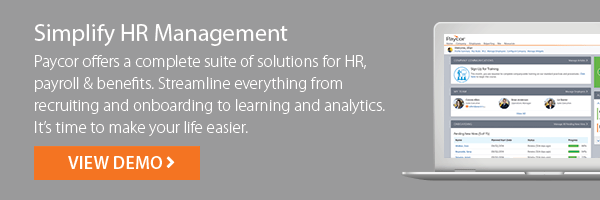If you ask a nurse to describe a typical workday, you’ll likely get one of the following responses: a raised eyebrow, a grunt and shake of the head, or straight out laughter.
All three say the same thing: There’s no such thing as a ‘typical day’ for a nurse. The job is stressful and physically demanding, with daily duties that include: physical examinations, changing dressings, administering medications, assisting with physical therapy, drawing blood, conducting diagnostic tests, consulting with physicians, maintaining detailed patient records…
And that’s all before lunch.
So, it’s easy to see how nurses can begin to feel unengaged or burned out. Career burn out in the nursing profession can have a serious impact on the overall quality of patient care, patient outcomes and patient satisfaction. Paycor knows how important it is to mitigate employee burnout and turnover, and to build a stronger feeling of professional engagement in nursing.
A 2019 National Nursing Engagement Report surveyed nearly 2,000 hospital nurses to measure their level of engagement and commitment to their respective hospitals. The report defined engagement as: “the extent of workforce commitment, both emotional and intellectual, to accomplishing the work, mission, and vision of the organization.”
Fully engaged nurses have an emotional and intellectual connection to their hospitals and care about the success of their workplace. They have fewer voluntary absences and are always looking for ways to improve the quality of their patient care.
By contrast, an unengaged nurse is one who does the bare minimum of the job requirements and is ambivalent to the success of their hospital. The report found that overall, 14.4% of hospital nurses and 20% of ER nurses describe themselves as feeling ‘unengaged’ in their jobs.
The study also identified three main drivers of engagement: 1.) Autonomy, 2.) Collaboration and Support, and 3.) Responsive Leadership. Let’s take a closer look at these nursing employee engagement ideas.
Autonomy

Nurses have said they are more likely to feel engaged when they are actively involved in the decision-making process regarding patient care and when they feel their opinions are valued by leadership. They also want more control over their nursing practice and to be allowed to make more job-related decisions.
Paycor recommends:
Scheduling Flexibility
One way to improve autonomy for nurses is to get them more involved in creating their own work schedules. For example, the flexibility to work shorter shifts will give them more control over their work/life balance. A 2016 study found that the number of nurses reporting burnout increased as shift length increased. Other research found that errors and complications increased with extended shift lengths.
Career Path Control
Another way to foster autonomy among your nursing staff is by giving them an opportunity to develop their own career path for growth within the organization. This may include creating a career ladder program so nurses have a clearer choice in what direction they want to take. Paycor can help develop individualized career plans that include specific, actionable steps toward realistic long-term goals.
Collaboration and Support

Secondly, nurses stated that they feel more engaged when they are part of a supportive RN team. This provides a network of support, collaboration and respect for one another. Teams that work together consistently express higher engagement with the organization and demonstrate better outcomes.3
Paycor recommends:
Recognition and Rewards
Develop a recognition program that rewards nurses for going above and beyond. This could consist of some type of monetary compensation. Share inspiring stories of the nursing staff in the hospital newsletter or internal communications.
Mentor Program
More experienced nurses, who may be nearing retirement and possibly interested in working shorter hours, can be paired with new nurses as mentors. This makes good use of their years of knowledge and experience, ensuring it gets passed on to the next generation. New nurses can gain valuable insights and confidence by having a mentor on hand to guide them through difficult situations.
Personal Assistant/ Daycare Services
Some hospitals may provide their nursing staff with personal assistants to help run errands to reduce the stress that many nurses experience. Offer daycare services or assistance to provide much needed help for nurses with young children.
Wellness Programs
In a similar vein, look for ways to sponsor free wellness programs that offer yoga or exercise classes or courses on healthy cooking/eating. These could be offered before, after, or even in the middle of a shift to give nurses a break from the stress of their duties.
Access to Leadership

Nurses also indicated that their level of engagement is driven by greater access to management. Fully engaged nurses feel that leadership is trustworthy and responsive to their needs. In fact, the report found that trust is a ‘foundational component’ to building an engaged workforce.
Paycor recommends:
Town hall meetings
One way for upper management to improve their visibility is to schedule regular town hall meetings with staff. This will help improve communications and give them an opportunity recognize outstanding performance of nurses. It will also provide staff opportunities to ask questions or voice their concerns directly.
Shared Governance
Upper management should create a shared governance program. Establish a staff leadership council to increase responsibility for RNs and empower them to influence change.
Happier Nurses Mean Better Outcomes

Paycor’s platform can help your HR Team better track and monitor employee engagement. Our Compensation Planning tool gives your business an edge in attracting and retaining quality employees. Additionally, our Pulse Survey tool gives you more accurate, timely data on how your employees are feeling so management can respond more quickly and accurately to their concerns.
Experts agree that improving nurse engagement is a key to improving patient care and clinical outcomes. Nurses who are more engaged in their work are happier and more committed to their organization’s mission.










